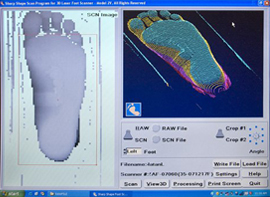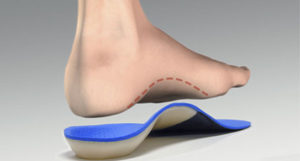Custom Orthotics to Improve Function and Ease Your Pain

Custom molded orthotics are individually designed, medically “corrective” shoe inserts. They are designed to significantly improve foot function in an effort to correct alignment abnormalities. These alignment abnormalities cause foot pain but they may also be responsible for knee, hip and even back pain.
A custom orthotic is uniquely designed for each individual patient. The custom fitting process designs an insert built for your specific anatomy. Medically corrective foot orthotics are made with a prescription from a licensed medical doctor and may even be covered by insurance.
Excessive pronation (flat foot) or supination (high arch) of the foot causes many problems including pain in the feet, knees, hips, and back. Orthotics can be used to correct a foot alignment issue resulting in decreased pain and improved walking mechanics.

Orthotic devices relieve many common Orthopedic complaints including:
- Plantar fasciitis
- Flat feet/pes planus
- Heel pain
- Achilles tendinitis
- Ankle sprains
- Arthritis/degenerative joint disease
- Hallux rigidus/great toe pain
- Heel spurs
- Collapsing/pronated foot
- IT band pain
- Knee pain
- Leg length discrepancy
- Low back pain
- Metatarsalgia/painful ball of the foot
- Neuroma
- Rigid/supinated foot
- Hip pain
- Sesamoiditis
- Shin or leg pain
- Tendinitis
There are many ways orthotics can be made to correct a foot alignment abnormality. For example, a wedge added to the inner (medial) side of the orthotic can be used to help support a collapsing arch, thus reducing the risk of tendinitis. Alternatively, a wedge added to the outside (lateral) side of the orthotic can be used to increase support and help prevent ankle sprains and ankle instability. The type of orthotic recommended will depend on your symptoms, the underlying cause for those symptoms, our comprehensive evaluation, the type of activity you do, and the shape of your feet.
Although custom orthotics are considerably more expensive than off-the-shelf devices, they last much longer and provide better corrective support. A thorough history, gait analysis and comprehensive foot examination are used to develop your orthotics.
The following are the main types of custom shoe inserts:
Rigid orthotics– Made of firm materials like plastics, fiberglass, and carbon fiber; these primarily address motion in the major foot joints below the ankle. If a foot imbalance is the cause of pain in your legs, thighs, or lower back, rigid orthotics designed for use in walking or dress shoes, are recommended.
Semi-rigid orthotics– These act as a balance aid during walking or athletic activities. They are made from foam with a thin, plastic shell laminated to it. These devices provide support for the foot during load-bearing activities like standing, walking, running, jumping and high-intensity exercising.
Soft orthotics– Designed to act as shock absorbers while providing gentle support and relieving pressure in sore spots. These inserts are made of compressible foam and have proven effective for treating arthritic feet and are widely used to care for diabetic foot conditions. They tend to be bulkier than other inserts and may require extra room in shoes or prescription footwear.
Interested in learning more about orthotics and if they can help you?
Come in today and meet Dr. Matthew Buchanan. Dr. Buchanan is an Orthopedic Foot and Ankle Specialist who has devoted his entire career to the surgical and non-surgical treatment of foot and ankle conditions. He practices at the Nirschl Orthopaedic Center in Arlington, Virginia on the campus of Virginia Hospital Center. You can schedule an appointment today by calling 703 525-2200.
